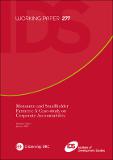| dc.description.abstract | The Smallholder Programme (SHP) was an initiative undertaken by the
transnational biotechnology, chemicals and seeds company, Monsanto. It had the
stated purpose of providing smallholder farmers with a package of agricultural
extension services, including technical advice, chemicals, seeds and other forms
of support. Drawing on recent empirical research undertaken in the United
States and India, this paper examines why and how the initiative was undertaken
by the company, and considers its implications in terms of corporate
accountability.
The accountability implications of the SHP were complex. This paper shows that
the programme was created partly in response to pressure from Monsanto’s
critics and anti-biotechnology activists, but also rooted in the company’s
strategic determination to commercialise and develop the market for genetically
modified (GM) crops and other products. Accordingly, the SHP was only
partially oriented around the needs of resource-poor farmers (more particularly,
around a set of implicit, prior assumptions about their interests). It was also a
strategic market-development tool, as well as a key part of a strategy to create
and promote a positive association between GM crops and smallholder farmers.
In some respects, the programme opened up new opportunities for farmers
and empowered them to make demands of Monsanto’s field staff, but the
accountability that this allowed was limited and imperfect. The story of the SHP
is also interesting because it shows that Monsanto succeeded, to some extent,
in integrating Corporate Social Responsibility (CSR) and sustainability aims into
its operations. Partly as a result, however, the quasi-philanthropic purposes of
the programme ultimately succumbed to competing commercial pressures and
the programme was closed. The case therefore provides an interesting insight
into challenges involved in ‘mainstreaming’ CSR.
Keywords: Monsanto, agriculture, corporate accountability, GM crops,
agricultural extension, smallholder. | en_GB |

